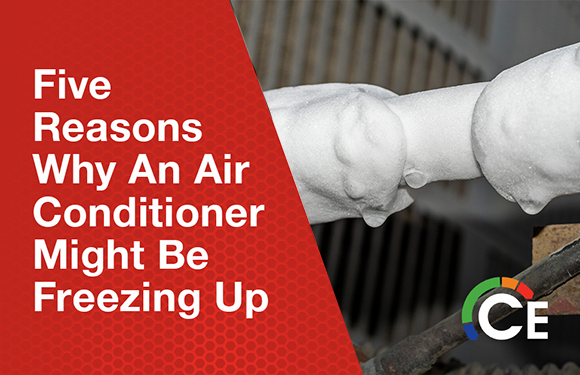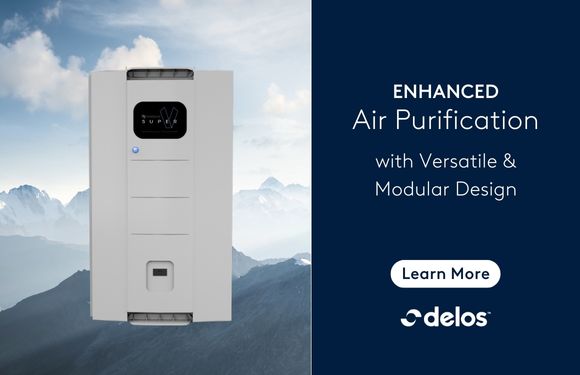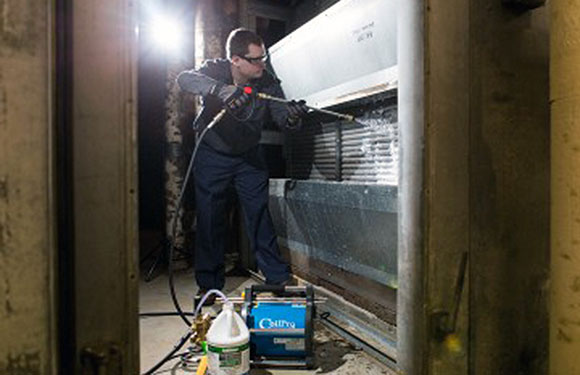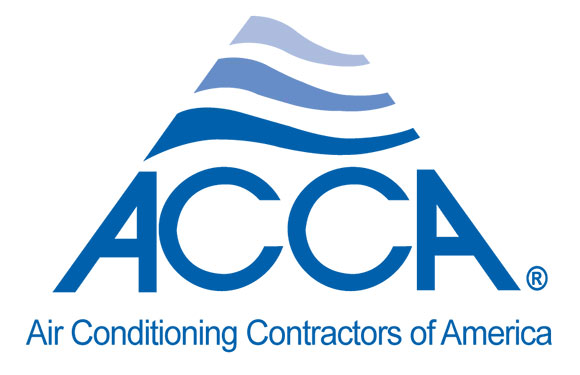
Items of Interest
Five Reasons Why An Air Conditioner Might Be Freezing Up
Contributed by Katie Conigliaro. Excerpted from CE News.
With summer nearly in full swing, HVAC service technicians should prepare for an increase in the number of service calls related to AC systems freezing up. Your HVAC business may receive a panicked call from a customer asking, “Why is my air conditioner blowing hot air?” or “Why is my AC freezing up?”
As an HVAC professional, you have the tools at your disposal to diagnose the problem, and CE has the AC parts you need to handle any repairs.
So, what causes air conditioners to freeze up? There are a handful of common causes that HVAC technicians should be aware of heading into a service call.
- Clogged Air Filters
Before taking apart the entire condenser unit to figure out what’s causing the system to freeze up, remember to take a close look at the air filter first. It may seem unlikely that a clogged filter could cause the entire system to freeze up and stop working, but it happens more than you might think.
A lack of airflow caused by an extremely dirty air filter can cause evaporator coils to freeze. If this is the case, the first thing you’ll want to do is to swap out the dirty air filter with a clean one. The evaporator coil will likely work again after it has had a chance to thaw out. If not, it may need to be replaced.
Be sure to emphasize the importance of changing air filters regularly to your clients. If filters aren’t changed at least once every 90 days, this problem will likely occur again.
- Damaged Blower Motor
An air conditioning system’s blower motor plays a vital role in keeping a home cool during the summer. Unfortunately, if a blower motor has become damaged or stops working altogether, this can cause the entire unit to freeze up and stop working. In some cases, if the motor has not died out completely, clients may notice that they have very little cool air coming through the vents.
Regardless, it’s crucial for HVAC professionals to check blower motors for signs of failure. A failing motor will emit a low rattling sound while trying to operate. If the motor has stopped working altogether, it’s likely that the evaporator coils will also be frozen.
Replacing a blower motor is a complex job — but it’s the only way to get the system blowing cool air again. Most blower motors have a lifespan of about 10-12 years and are quite expensive to replace, so some clients may opt to replace the entire system if it’s on the older side. As an HVAC professional, it’s your job to present your clients with all their possible options to make an informed decision.
- Dirty Coils
Another possible cause of an AC system freezing up during the summer months is dirty refrigerant coils. Ideally, AC coils should stay clean and damp. When they become dirty, dust and other debris can build up over the coils themselves and trap cold air inside. Over time, this can cause the entire coil to freeze up.
Dirty air filters are almost always the cause of dirty refrigerant coils, so communicate the importance of replacing AC filters often to prevent this problem from happening again. A refrigerant coil is relatively quick and easy to replace (and can even be thawed out in some cases), but over time, these issues can damage other parts of the system.
- Collapsed Air Ducts
If the system and its parts seem to be in good working order, but cool air still isn’t making it out of the home’s vents, there’s a good chance that a collapsed air duct could be to blame. When even one air duct fails within a building, this can affect the entire ventilation system, causing the AC unit to lose airflow completely.
Diagnosing a blocked or collapsed air duct can be a time-consuming process. However, once the location of the blocked duct is pinpointed, replacing the section of ductwork or unclogging the duct can resolve the issue quickly. HVAC professionals should check to ensure that the system’s airflow is balanced so that the problem doesn’t occur again.
- Low Refrigerant
HVAC technicians are encouraged to check for low refrigerant levels anytime a client calls and reports that their air conditioning is freezing or not putting out cold air. AC compressors rely on a specific level of refrigerant to cool air as it passes over the coils. When refrigerant levels are too low, this can cause moisture to freeze on the coils themselves. Over time, this results in the coils freezing up and a lack of function from the unit overall.
If refrigerant levels on an AC unit are measuring low, it’s important to determine the cause. Otherwise, simply topping off the refrigerant will only be a temporary solution to the problem. If there is a refrigerant leak within the system, this needs to be repaired before the refrigerant can be recharged.
Find the Quality Parts You Need
Troubleshooting an air conditioning system that is freezing up or blowing hot air is one of the most common things an HVAC technician will do during the hot summer months. And while these are some of the most common causes of an AC system that has frozen up, it’s not an exhaustive list of possible issues. Other possibilities to consider include low voltage to the system’s fan, mechanical problems and even a sudden drop in outdoor temperature.
No matter what AC parts you need to resolve the problem, you can always count on CE. We pride ourselves on carrying only the highest quality parts from the most trusted brands in the industry. Contact us today to learn more about what we can do for you.













